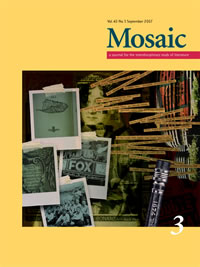Issue 40.3
Overview

General Issue
Published: September 2007
View the issue introduction or see the issue summary and contents below.
10 essays, totalling 192 pages
$16.95 CAD
In several different ways, this issue explores "multimedia" writing. The ten essays collected here cross media and genres to engage such issues as: the relationship of writing to technology; adaptionist readings of novels; tensions between orality and writing; similarities between poetry and painting; writing as an instrument for sculpting bodies; the treatment of writing and writers as artifacts. The issue also takes up the question of memory: post-Holocaust memory as dependent upon writing that is oriented toward a future; and collective remembering as facilitated through discourses of hysteria.
In Memoriam: Levinas, the Holocaust, and the ImmemorialMichael Bernard-Donals This essay explores Levinas's understanding of memory as it is connected to the Holocaust in the dedications to Otherwise than Being. Post-Holocaust memory is dependent upon writing oriented toward a future, not an irrecuperable, immemorial event. It is from this theory of "forgetful memory" that there emerges a post-Holocaust ethics. | |
“I am the molten heart of the world”: Language and Metamorphosis in Diane Duane’s Young Wizards SeriesJes Battis This essay reads the books of Diane Duane’s Young Wizards series as novels of sexual and gender metamorphosis, looking particularly at magic within Duane’s work as a linguistic instrument for sculpting bodies. It argues that YA novels in particular represent adolescent turmoil through narratives of wizardry and marvellous trans- formation, with Duane’s work occupying a significantly feminist position. | |
Word Dust: William Burroughs’s Multimedia AestheticDaniel Punday William Burroughs is increasingly seen as a “multimedia” writer. This essay synthesizes his often contradictory claims about the relationship between writing and other media. Burroughs warns against the simple mixture of heterogeneous media elements, and urges us instead to attend to the vicissitudes of the material within the cross-media text. | |
“Graphism” and Story-time in MementoTony E. Jackson This essay brings together theories of writing as a technology and theories of cognitive semantics with the film Memento in order to make the case that cinema disembodies the human sense of story-time. | |
Trauma Remembered and Forgotten: The Figure of the Hysteric in Kerri Sakamoto’s The Electrical FieldVikki Visvis Kerri Sakamoto’s novel The Electrical Field successfully resists a new and insidious form of social amnesia surrounding the Japanese-Canadian internment. Perpetuated by the act of collective remembering and reinforced by the telelogocial structure of social and literary narratives representing the interment, this communal forgetting is resisted through the novel’s use of discourses of hysteria. | |
Reinventing Fanny Price: Patricia Rozema’s Thoroughly Modern Mansfield ParkDavid Monaghan Rozema claims that, in reimagining Fanny Price, she has uncovered a contemporary “Jane Austen.” An exami- nation of the movement motif in film and novel versions of Mansfield Park reveals that Rozema’s achievement is actually to make a plot based closely on the novel express a world view very different from Austen’s. | |
“Degas the Sonneteer”: Transcending Disciplinary Boundaries and Building a New AestheticJessica Locheed Late in his career, Degas turned to poetry as a new form of artistic expression. This essay analyzes this poetry in terms of the theoretical and physical process of his contemporary visual works. It also examines the similarities between the poetic principles and practices of Degas with those of Mallarmé. | |
Writing, Speaking, and Gender Blending: Reading Greek Allusions in Truth and Bright WaterSuzanne Rintoul This essay explores how King’s allusions to Greek oral history align maternal/paternal conflicts with structural tensions between orality and writing. King suggests that the preservation of oral culture lies in rejecting binary thinking that insists on the discreteness of oral and written by denaturalizing the mother/father binary. | |
“Authenticism,” or the Authority of AuthenticityAna María Sánchez-Arce This essay introduces the notion of “authenticism” and analyzes the tendency to treat writers and literature as artifacts to be valued in relation to their origins rather than in their own right. Authenticism’s conservatism and illiberal politics are discussed via a close reading of Percival Everett’s Erasure. | |
“Why don’t you just leave it up to nature?”: An Adaptationist Reading of the Novels of Jeffrey EugenidesKenneth Womack and Amy Mallory-Kani As parables of human nature, The Virgin Suicides and Middlesex act as a duet of adaptationist behaviour in which Detroit—arguably one of the hubs of the American Dream—operates as the fulcrum and the events of August 1974—the apex of the Watergate crisis—function as the lever. |